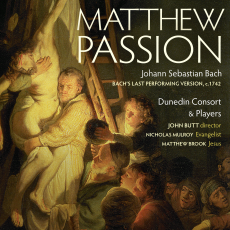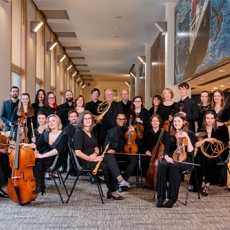JS Bach Matthew Passion - Dunedin Consort - Classic FM magazine
Disc of the Month!
Finding the Passion.
John Butt has spent a lifetime researching Bach's music. On a striking new recording he leads his Dunedin Consort on a journey through Bach's sublime St Matthew Passion.
On the international conveyor-belt of concerts and recordings, it's never long before one of Bach's Passions rolls along - and at this time of year - you can't really avoid them. But, then, why would you want to? The St Matthew and St John Passions have become two of the most important pieces in the repertoire; works that have certified Bach's genius while posing perhaps the most assured demonstration of religious faith in the history of music.
It's a little ironic, then, that the Passions were heard far less by their creator and his contemporaries than they are by us today. These musical settings of the story of Christ's final days were born out of liturgical need - written for performance on Good Friday at St. Thomas's Church in Leipzig - and Bach would probably have been surprised and bemused to learn that they were to be hallowed, revived and recorded two -and-a-half centuries later. In fact, he might have been inclined to believe that they'd be discarded - which they were by some succeeding generations. It was Felix Mendelssohn who eventually unearthed the score of the St Matthew Passion and revived it almost a hundred years after its composition adding clarinets and a piano to the scoring in the process.
And in Mendelssohn's act lies the question that has fascinated scholars, performers and listeners for much of the 20th century: now, and with what musicians, should Bach's Passion be performed? All the evidence suggests that Bach asked himself this question too - every time he opened the score and planned a performance of one the works. For Bach, no two performances of any his Passions would have been the same (there were four Passions in all - the St. Mark and St. Luke have since been lost). He would often re-score the works depending on available musical personnel and liturgical requirements. For Bach, each new performance was a new beginning.
Perhaps the most significant re-birth the St Matthew Passion has experienced since that gifted it by Mendelssohn has been the ascendance of the ‘authentic' performance movement. Recordings in recent years have edged ever closer to presenting the music with the sort of forces Bach would have recognised. But more significant than what we see is what we hear: with authentic performance so much Baroque music has acquired a tremendous but disciplined energy, a renewed focus and a far greater sense of excitement and integrity.
The touching and engaging new recording from the Edinburgh-based Dunedin Consort and Players has been guided by one of the foremost experts on Bach's life and music: John Butt. Not only is Butt a respected Bach scholar he also knows a thing or two about ‘authenticity' in performance - in fact, he wrote the book; Playing with Historywas the text that first explored the aims and questions surrounding period performance. Butt is pragmatic about these aims, especially in the light of this recording. ‘Throughout history we've had different expectations' he says of the Baroque works that have been brought to life by period practice. ‘If you suggest that a piece is tied down to one ideal performance then you suggest that the piece isn't very good or that it's imitated.'
Bach would no doubt have agreed. Still, this recording is special and unique. Butt has turned to Bach's last version of the Passion using two harpsichords rather than the usual single harpsichord allocated to choice one (with an organ allocated to choir two). Of course, there's nothing to suggest that Bach wouldn't have further amended the scoring - or even reversed his decision - if he'd lived longer. But the double-harpsichord sound characterises this performance as much as the presence of a handful of superb singers.
Performances of stunning conviction from the vocalists and their root-like attachment to the instrumentalists accompanying them, are what set this disc apart. There's a purity to the voices but they are alive with drama too. Alto Claire Wilkinson beckons Part Two of the Passion into existence with the most exquisitely introduced ‘Ach, nun is mein Jesus hin' (‘Oh, now my Jesus is gone') while her ‘Ebarme dich' (‘Have mercy') has a 'siciliana' feel mirrored by the melancholy sway of the accompanying strings. Butt's tempos are brisk but slightly controlled from the opening chorus, in which he also conjures a palpable sense of drama and dialogue.
More than any nuance of technical detail, this disc conveys a tangible sense of journeying. Butt's singers pose a human glimpse of the Passion story, each taking a number of roles, becoming both participant and observer as they bring Bach's various voices to life. Listening, with Linn's acutely recorded sound, you genuinely fell like you're making the journey with them.

